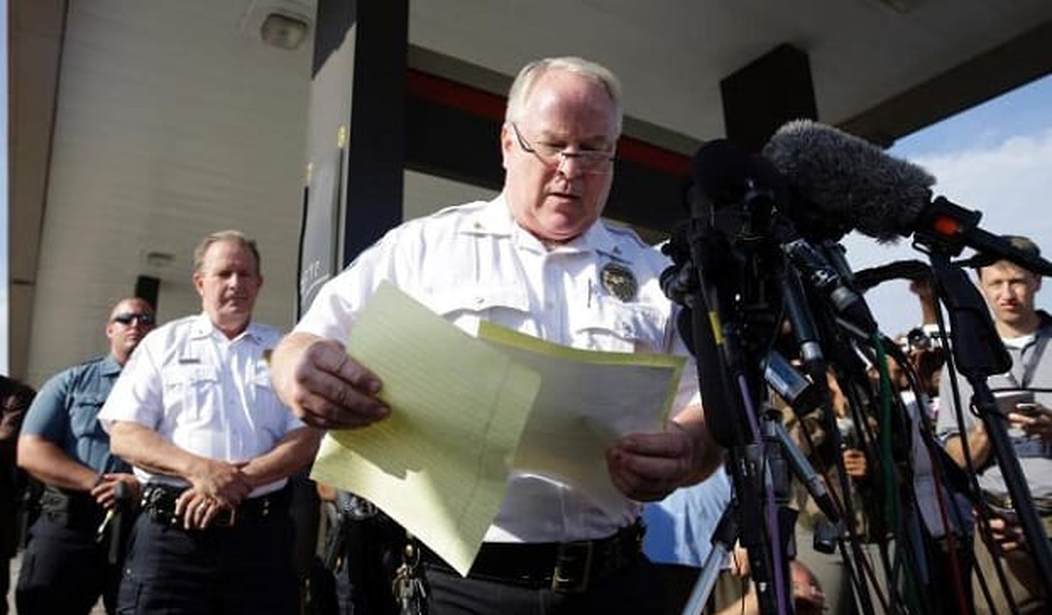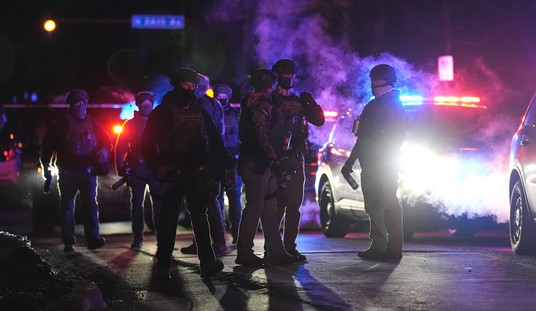It’s unfortunate, the way news is consumed and interpreted in the age of twitter. Everyone feels tremendous pressure to form an opinion quickly and state it loudly and with certainty. Once this has been done, people are highly resistant to changing their minds and they become impervious to new evidence, often dismissing out of hand outright facts just because they are reported by a given source (e.g., “the media is untrustworthy” or “you can’t trust the Holder Department of Justice.”) Perhaps nowhere has this phenomenon been more obvious (or regrettable) than in Ferguson, Missouri, in the wake of the shooting death of Michael Brown. Interpreting the news out of Ferguson has become a part of ideological tribalism in which, if you are a conservative you stand for the Ferguson PD and if you are a liberal you stand against them. Thus, liberals have become highly resistant to assimilating information that strongly suggests that “hands up, don’t shoot” never happened. Conservatives, on the other hand, have become highly resistant to assimilating information that strongly suggests that the Ferguson PD – as with many other municipal police departments in the country – truly is out of control, in that it recklessly violates the constitutional rights of the citizens of Ferguson and does so in a manner that has a clearly disproportionate impact on minorities.
I took the time over the weekend to read the entirety of the 102-page Department of Justice report on the Ferguson PD (“FPD”). I cannot recommend highly enough that you do the same. During the course of this reading, I intentionally read it with as jaundiced of an eye towards the Department of Justice as possible. I intentionally disregarded all commentary regarding what the DOJ investigators reported that they saw, and also all of their reported interviews of the citizens of Ferguson and FPD officers. I decided to say to myself, let’s assume that everything DOJ says is a lie, and also that everyone who was willing to talk to the DOJ during the course of their investigation either lied or shaded the truth. What remained astounded me.
Even if you read only the parts of the Ferguson DOJ report that come directly from the files of the FPD (which is to say, files that would be most favorable to the Department), the report paints an incredibly damning picture of the Ferguson Police Department. No conservative on earth should feel comfortable with the way the Ferguson PD has been operating for years, even according to their own documents.
The reflexive defense of the FPD by conservatives tends to come from two sources: the first is the belief among many conservatives that Officer Darren Wilson was telling the truth and that the witnesses and friends of Michael Brown were lying – and thus by extension, the DOJ is perceived to be taking the “Michael Brown side” and therefore is not credible. However, this particular source of distrust makes no sense as the DOJ likewise did not charge Officer Wilson in connection with the Michael Brown shooting. Thus, insofar as the credibility of a person is judged by whether they believe the spurious “hands up, don’t shoot” narrative, the DOJ comes down on the side of conservatives.
The second is the belief that the FPD was unfairly targeted by the DOJ as retribution for the fact that Officer Wilson was not indicted by the local authorities. Many conservatives I have spoken to are of the opinion that the FPD is no worse than any other police department and that they oppose the FPD being targeted simply because of the Michael Brown incident. I suppose this is probably true, but what I don’t understand is why that is seen as a feature, not a bug. The information I am going to describe below is appalling and breathtaking. If Ferguson is no worse than other cities, then why don’t we say that the problem is that all cities need to look very hard at fixing their municipal police departments, rather than that the Ferguson PD should be excused?
As I was discussing some of the racial disparity statistics last night on twitter, one person contended with me that I should recognize that blacks were targeted for stops in Ferguson at a lower rate than they are nationally. If true, doesn’t that indicate that the problem is bigger, not smaller, than we suppose? Are we this committed to a news narrative that is friendly to our ideological tribe that we view it as completely excuplatory that a given police department is less racially biased than the average police force in America?
Enough with the preamble. Let’s get in to what the Ferguson DOJ report says – again, completely ignoring all the portions generated from DOJ interviews or commentary. See if you are truly comfortable with a municipal police force operating in this manner.
I. The Ferguson Police Department acts almost exclusively as a revenue generation machine for the city.
Perhaps the most damning portion of the DOJ report is the beginning, which lays out in painstaking detail (consisting entirely of information pulled from the City of Ferguson’s records) that the FPD’s primary purpose in Ferguson was to generate revenue for the city’s budget. The report contains a shocking volume of documentary evidence, including emails, that Ferguson’s police supervisors, including the City Manager, repeatedly hounded Ferguson officers to increase their ticket fines without regard to whether the tickets they were writing were justified. While police departments across the country like to repeatedly claim that they do not have “ticket quotas,” and that they are solely interested in public safety, this report gives the lie to that claim, at least in Ferguson. The internal emails collected during this investigation show a pattern of behavior that most Americans have long suspected exists behind closed doors in many police departments: discipline issued for failing to write enough tickets, threatening emails to cops who are under performing in writing tickets, and prominent “score sheets” posted showing who top “performers” are.
If you read nothing else in the report, flip to page nine, roman numeral 3, and read that section. The results of this tremendous top-down pressure are astounding. Between the years of 2010 and 2014, revenues from fines and fees assessed by the Ferguson PD almost tripled, from $1.38M to over $3.0M. As a consequence, the portion of the city’s budget that was comprised by revenue from these fines increased from about 10% to about 25%. Each year the city has budgeted for these increases and clearly ordered the FPD to get them at any cost.
In this respect, at least, Ferguson is illustrated to be much worse than surrounding municipalities. Fines for trivial offenses like having tall grass at your home are much, much worse than surrounding localities. The overall revenue of Ferguson is more closely tied to this downward pressure than other localities in the area – again, according to Ferguson’s own internal documents including emails from city Finance officials bragging about their brilliant revenue generation plan.
The results of this pressure to write tickets are eminently predictable. If you tell a cop to write more tickets or else, he will write more tickets. If the pressure continues, he will write more tickets for more trivial (and more legally questionable) offenses. He will likewise seek to maximize the use of his time by issuing as many tickets as he can per each stop – and the evidence (again, exclusively from FPD records) demonstrates that this is exactly what happens. And the evidence further shows (again, exclusively from FPD records) that Ferguson’s black community did, in fact, suffer the brunt of these legally questionable and trivial stops, and also that they were far more likely to suffer from “ticket stacking”. More on that later.
Worse still, the entire municipal system, including the City’s municipal court, is under the supervision of the FPD and clearly views their sole job as ratcheting up the collection of fines and fees rather than fairly adjudicating cases before them. In spite of the fact that a significant portion of Ferguson’s population lives below the poverty line, Ferguson has no system in place to determine ability-to-pay with respect to municipal fines and offers no community service alternative for those who are unable to pay. As a result, the Ferguson municipal court and police system operates functionally as a debtor’s prison. Inability to pay fines, or missing a single payment on a payment plan, results in the immediate issuance of an arrest warrant – the crippling effects of which are seen in the sheer volume of these warrants that are issued. In the last year alone, the city issued over 9,000 warrants for failure to pay fines, and there are over 16,000 of these warrants currently outstanding. Given that Ferguson has a total population of 21,000 people, this provides a perverse and ready incentive for Ferguson cops to stop virtually any citizen they see without probable cause and “run their license” for warrants – and evidence (from FPD’s own records) indicate that this was a regular practice, and that its brunt was felt almost exclusively in Ferguson’s black community (over 96% of the people who were arrested solely for having an oustanding warrant during the study period were black).
II. The Ferguson PD Habitually Uses Excessive Force
Here is one area where there was quite a lot of information gathered by the DOJ based on their interviews with Ferguson residents about alleged uses of excessive force. I summarily disregarded all of this information. Based only on the information contained within the actual FPD “use of force” reports, the FPD habitually uses excessive force in blatant violation of the Constitution and their own policies. By the officers’ own descriptions in the reports they turned in, they habitually used force that was excessive to the required situation, especially with respect to their use of canine attacks and taser attacks. Numerous instances even within these (quite possibly sanitized) reports indicate that officers used force in response to mere verbal belligerence or no force at all. Numerous inmates were, by officers’ own admissions in these reports, tased while behind locked bars (in one instance, an inmate was tased in the back while he was behind closed and locked bars). Canines were used in situations where, by the officers’ own descriptions, force was not necessary.
Further, by the words of the officers’ own reports, both tasers and canines were used in situations where no force – or much more minimal – force was required. In one instance, an officer was equipped with one of the “new” tasers that has a camera that is activated when it is in use and clearly showed the officer tazing a suspect who was offering no threat at all to the police officer in question. The clear impression, even from the Ferguson PD’s own evidence, is that the Ferguson PD for years has used force – especially tasers – in a retaliatory way towards anyone who commits “contempt of cop” rather than as a means to ensure the safety or the public or of officers. And as with almost all other aspects of the report, it was demonstrated that Ferguson’s black community was much more likely to have force – as well as inappropriate force – used against them. For instance, each and every single instance of canine attack ordered by the Ferguson PD was against a black suspect. Blacks were shown, even among the population of arrested citizens, to have tasers and other methods of physical force used against them with far greater frequency. More on that later.
III. The Ferguson PD has Utterly Failed to Supervise its Officers’ Use of Force
By far the most damning aspect of the FPD’s use of force is the clear and convincing evidence that they have utterly failed to supervise their officers concerning their use of force or to correct any instances of excessive use of force at all. Even more damning, there is convincing evidence that the FPD has failed to properly document its use of force at all as required by their own policy.
The FPD has required, by their own policy, that for each and every use of force, there is supposed to be a “Use of Force” Report that is forwarded up the chain to ensure adequate supervision and monitoring of the Department’s use of force. However, a review of these Reports indicated that many of them had not been reviewed by supervisors at all, and that even the ones illustrating a clearly excessive use of force had incurred no corrective action was taken by the supervisory officer.
However, the two most clear control issues were as follows: First, anyone of rank sergeant or above reviews their own “Use of Force” Reports. This is a completely inexcusable practice that ensures that a significant part of the FPD operates effectively without any supervision whatsoever with respect to their use of force.
The second is evidence that widespread use of force occurs by the FPD that is not reported. Even ignoring the numerous rep0rts from citizens of Ferguson regarding uses of force that were not documented by the police, an examination of the FPD’s own records indicated that numerous uses of force occurred where no “Use of Force” Report was filed. For instance, DOJ investigators found numerous examples of interdepartmental emails discussing various uses of force without a corresponding “Use of Force” Report on file. Similarly, numerous officers filed Workers’ Comp cases wherein they described sustaining injuries during the course of using force – yet no corresponding “Use of Force” Report was found on file. This is exactly the sort of evidence that, to an attorney (as well as to most reasonable people) would indicate that there was, within the Ferguson PD, a widespread failure to even account for their police officers’ use of force, much less to exercise meaningful supervision of the same. Instead, the clear impression is that the FPD only documented uses of force where they felt they were clearly justified, and even then, they fell short.
And, again, the evidence shows clearly that minority – especially black – residents of Ferguson bore a disproportionate share of of the FPD’s excessive use of force.
IV. The Ferguson PD Systematically Punishes Residents of Ferguson for ‘Contempt of Cop’
One of the most infuriating sections of the DOJ report describes the misuse and abuse of several municipal code sections that are blatantly facially overbroad under the constitution and serve no purpose other than to allow cops to arrest and fine the citizens of Ferguson for offenses that can only be described as “contempt of cop” violations. The DOJ brief is replete with instances of dozens of citations and arrests for violations of the City’s “Failure to Obey,” “Failure to Comply,” “Manner of Walking,” and “Resisting Arrest,” where, even according to the charging document, the charged conduct can only be described as making a police officer irritated. Numerous instances were recounted where citizens were arrested for “Failure to Obey” or “Failure to Comply” where the described order was facially illegal or in excess of legitimate police authority.
Charging documents (again provided by the FPD) revealed that in officers’ own words, they arrested and cited citizens in retaliation for exercising their First Amendment rights not to be polite to cops, including one woman who was, by admission, arrested for peacefully calling an officer’s supervisor during the course of that officer making an arrest in her presence that she felt involved the excessive use of force. The Ferguson PD also engaged repeatedly in conduct that can only be described as retaliation against citizens for attempting to videotape them, a behavior that has been roundly condemned on the conservative side of the aisle.
The Ferguson PD also has policies and practices that are blatantly unconstitutional and that essentially invite any FPD officer to stop any person in Ferguson without probable cause or judicial oversight for the purpose of running their warrants (see above). One particularly troubling aspect of this system set forth in the report is the Ferguson PD’s use of “wanteds,” a system in which the Ferguson PD is essentially allowed to issue their own arrest warrants without judicial oversight at all and which is predictably by all accounts subject to widespread abuse. The “wanteds” system, even as described in the words and policies of the FPD, is a blatant violation of Constitutional Fourth Amendment warrant protections and is characteristic of the FPD’s systematic disregard for the Fourth Amendment even as set forth in their own documentary evidence.
The rule of law and rule of cop are different things. The former is important to any free and ordered society; the latter is a hallmark of despotism and tyranny. The Ferguson PD appears not to know the difference.
V. The Evidence of Racial Bias in the Administration of Justice in Ferguson is Overwhelming
To the extent that conservatives have engaged the evidence of racial bias compiled in the Ferguson DOJ report, they have tended to focus on two things: a) the fact that the racially-tinged emails from City of Ferguson officials are not probative or dispositive of systematic racial bias in the Ferguson PD and b) discrediting the witness/cop interview evidence complied by the DOJ. However, even if you completely remove both the racially inappropriate emails and ALL of the information collected by the Ferguson PD, the evidence of at least subconscious racial bias, based solely on statistics reported by the FPD, is overwhelming and cannot be dismissed.
Much has been made of the fact that blacks are more frequently stopped by the Ferguson PD than whites; however, the more conclusive and indicative evidence of racial bias comes in the disposition of the suspect after the stop has occurred. From the report:
African Americans are 2.07 times more likely to be searched during a vehicular stop but are 26% less likely to have contraband found on them during a search.
They are 2.00 times more likely to receive a citation and 2.37 times more likely to be arrested following a vehicular stop.
African Americans have force used against them at disproportionately high rates, accounting for 88% of all cases from 2010 to August 2014 in which an FPD officer reported using force. In all 14 uses of force involving a canine bite for which we have information about the race of the person bitten, the person was African American.
African Americans are more likely to receive multiple citations during a single incident, receiving four or more citations on 73 occasions between October 2012 and July 2014, whereas non-African Americans received four or more citations only twice during that period.
African Americans account for 95% of Manner of Walking charges; 94% of all Fail to Comply charges; 92% of all Resisting Arrest charges; 92% of all Peace Disturbance charges; and 89% of all Failure to Obey charges.
African Americans are 68% less likely than others to have their cases dismissed by the Municipal Judge, and in 2013 African Americans accounted for 92% of cases in which an arrest warrant was issued.
African Americans account for 96% of known arrests made exclusively because of an outstanding municipal warrant.
FPD reported 11,610 vehicle stops between October 2012 and October 2014. African Americans accounted for 85%, or 9,875, of those stops, despite making up only 67% of the population. White individuals made up 15%, or 1,735, of stops during that period, despite representing 29% of the population. These differences indicate that FPD traffic stop practices may disparately impact black drivers.39 Even setting aside the question of whether there are racial disparities in FPD’s traffic stop practices, however, the data collected during those stops reliably shows statistically significant racial disparities in the outcomes people receive after being stopped.
Unlike with vehicle stops, assessing the disparate impact of post-stop outcomes—such as the rate at which stops result in citations, searches, or arrests—is not dependent on population data or on assumptions about differential offending rates by race; instead, the enforcement actions imposed against stopped black drivers are compared directly to the enforcement actions imposed against stopped white drivers. In Ferguson, traffic stops of black drivers are more likely to lead to searches, citations, and arrests than are stops of white drivers. Black people are significantly more likely to be searched during a traffic stop than white people. From October 2012 to October 2014, 11% of stopped black drivers were searched, whereas only 5% of stopped white drivers were searched.
Despite being searched at higher rates, African Americans are 26% less likely to have contraband found on them than whites: 24% of searches of African Americans resulted in a contraband finding, whereas 30% of searches of whites resulted in a contraband finding. This disparity exists even after controlling for the type of search conducted, whether a search incident to arrest, a consent search, or a search predicated on reasonable suspicion. The lower rate at which officers find contraband when searching African Americans indicates either that officers’ suspicion of criminal wrongdoing is less likely to be accurate when interacting with African Americans or that officers are more likely to search African Americans without any suspicion of criminal wrongdoing. Either explanation suggests bias, whether explicit or implicit. 40 This lower hit rate for African Americans also underscores that this disparate enforcement practice is ineffective.
Other, more subtle indicators likewise show meaningful disparities in FPD’s search practices: of the 31 Terry stop searches FPD conducted during this period between October 2012 to October 2014, 30 were of black individuals; of the 103 times FPD asked both the driver and passenger to exit a vehicle during a search, the searched individuals were black in 95 cases; and, while only one search of a white person lasted more than half an hour (1% of all searches of white drivers), 59 searches of African Americans lasted that long (5% of all searches of black drivers).
Of all stopped black drivers, 91%, or 8,987, received citations, while 87%, or 1,501, of all stopped white drivers received a citation.41 891 stopped black drivers—10% of all stopped black drivers—were arrested as a result of the stop, whereas only 63 stopped white drivers—4% of all stopped white drivers—were arrested. This disparity is explainable in large part by the high number of black individuals arrested for outstanding municipal warrants issued for missed court payments and appearances. As we discuss below, African Americans are more likely to have warrants issued against them than whites and are more likely to be arrested for an outstanding warrant than their white counterparts. Notably, on 14 occasions FPD listed the only reason for an arrest following a traffic stop as “resisting arrest.” In all 14 of those cases, the person arrested was black.
These disparities in the outcomes that result from traffic stops remain even after regression analysis is used to control for non-race-based variables, including driver age; gender; the assignment of the officer making the stop; disparities in officer behavior; and the stated reason the stop was initiated. Upon accounting for differences in those variables, African Americans remained 2.07 times more likely to be searched; 2.00 times more likely to receive a citation; and 2.37 times more likely to be arrested than other stopped individuals. Each of these disparities is statistically significant and would occur by chance less than one time in 1,000. The odds of these disparities occurring by chance together are significantly lower still.
(Emphasis mine). This is by no means all of the evidence compiled in the report showing racial bias endemic in the Ferguson law enforcement system, including the handling and disposition of their cases from the Municipal Court on down. One of the more infuriating sections of the report proves – again, through documentary evidence collected from the FPD – that the FPD and Municipal Court employees and clerks regularly and systematically intervene in the judicial process to have tickets and citations for their friends dismissed. Because the Ferguson PD is almost entirely white, and the Municipal Court employees are 100% white, this means as a matter of practicality that most of their friends are probably white, and this is seen in the fact that if you are white and live in Ferguson, you have over a 30% chance of getting a ticket “dismissed” through knowing somebody whereas if you are black your chances are virtually zero.
V. Conclusion
I am not going to sugar coat this or engage in a lot of pointless throat clearing here – the report, taken as a whole, even in terms of material collected exclusively from FPD documents, is incredibly damning of police and municipal court practices in Ferguson. Anyone who can read the actual report itself and be comfortable with the fact that citizens of an American city live under such a regime is frankly not someone who is ideologically aligned with me in any meaningful way. The practices of the FPD and Municipal Court are destructive to freedom and in blatant violation of our constitutional rights, and they depend for sufferance on the fact that most people are not willing (or, in the case of most of Ferguson’s residents, able) to mount an expensive legal fight for relatively trivial amounts of money such as are involved in a traffic ticket. Evidence of the Ferguson PD’s knowledge of their blatantly unconstitutional practices (especially with respect to the habitual issuance of arrest warrants for missing a payment) is shown in the report by the way that the Municipal Court regularly drops these warrants as soon as a defendant appears with counsel.
I am singularly unimpressed with the argument that the report should be dismissed because it is the product of the Holder DOJ’s dissatisfaction at the resolution of the Michael Brown case. The implicit admission in such an argument is that many police departments are worse; if so, the proper response is not to excuse the Ferguson PD but rather to acknowledge that there are, in fact, systemic problems that exist on a widespread basis that should also be solved.
These problems, largely, have their root in the first matter highlighted above – that many municipal police departments face increasing and unrelenting pressure from city hall to fill increasingly wide gaps in revenue with money from fines and citations. Even a well-intentioned police officer who respects freedom, the citizenry, and vulnerable populations can succumb to temptation when his paycheck and his ability to feed his family is put on the line. And in those cases, where legitimate offenses do not occur, he will be sorely tempted to create them, and to create them among the portion of the populace that is least likely to complain and least likely to be believed when they do complain: non-wealthy black citizens.
Until we, as a people, are willing to understand and address the problem, it will never get better. Until we are willing to hold our municipal officials accountable for using the police force to suck money out of people’s pockets instead of legitimately protecting the public safety, the problem will get worse. But most importantly, until and unless we are able to emotionally detach ourselves from the horrible Michael Brown situation and see that what has been exposed, even according to the (probably whitewashed) FPD records, is a travesty, there is no hope for improvement.
And I categorically reject and condemn the claim that this report or President Obama’s comments upon it led to the shooting of those two officers in Ferguson. Like everyone else, I deplore and condemn these acts of unjust violence. But the fact that they occurred does not mean that the truth behind the report caused them. It is possible to condemn unjust and oppressive policing and also the unprovoked murder of police, and it is indicative of societal sickness caused by excessive partisanship that makes us unable to see that.
We can do better than our response to the Ferguson DOJ report. And our country deserves better from us.














Join the conversation as a VIP Member